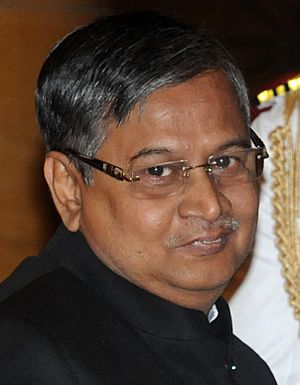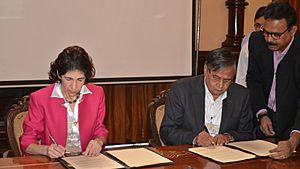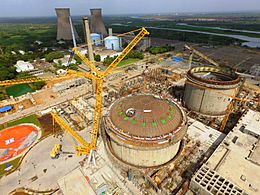Sekhar Basu facts for kids
Quick facts for kids
Sekhar Basu
|
|
|---|---|
 |
|
| Chairman of the Atomic Energy Commission | |
| In office 23 October 2015 – 17 September 2018 |
|
| Director of the Bhabha Atomic Research Centre | |
| In office 19 June 2012 – 23 February 2016 |
|
| Personal details | |
| Born | 20 September 1952 Muzaffarpur, Bihar, India |
| Died | 24 September 2020 (aged 68) Kolkata, West Bengal, India |
| Residences | Mumbai, India |
| Alma mater | Ballygunge Government High School Veermata Jijabai Technological Institute, Mumbai BARC Training School |
| Profession | Nuclear scientist |
| Awards | Padma Shri (2014) Indian Nuclear Society (INS) Award (2002) Department of Atomic Energy (DAE) Award (2006 and 2007) |
Sekhar Basu (born September 20, 1952 – died September 24, 2020) was an amazing Indian nuclear scientist. He led the Atomic Energy Commission and was a top official for India's Department of Atomic Energy (DAE). He also directed the Bhabha Atomic Research Centre (BARC).
Mr. Basu was also in charge of the Nuclear Submarine Program. Later, he became the Chief Executive of the Nuclear Recycle Board at BARC. In 2014, he received the Padma Shri, which is India's fourth highest award for civilians.
He is famous for helping to build the nuclear reactor for India's first nuclear submarine, the INS Arihant. He also worked on plants that recycle nuclear waste in Tarapur and Kalpakkam. Another big project he helped with was the Indian Neutrino Observatory in Theni, Tamil Nadu.
Contents
Early Life and Career
Sekhar Basu was born on September 20, 1952, in Muzaffarpur, Bihar, India. He went to Ballygunge Government High School in Kolkata. Later, he studied mechanical engineering at Veermata Jijabai Technological Institute in Mumbai. He finished his degree in 1974.
In 1975, he joined the Bhabha Atomic Research Centre (BARC). He worked in the Reactor Engineering Division. Over time, he became the project director for the Nuclear Submarine program. He also became the chief executive of the Nuclear Recycle Board at BARC.
In 2012, he became the Director of the Bhabha Atomic Research Centre. Then, in 2015, he was chosen to be the chairman of the Atomic Energy Commission. He also became the Secretary to the Government of India for the Department of Atomic Energy (DAE). He held these important roles until September 2018.
Important Projects
Nuclear Waste Recycling
As the Chief Executive of the Nuclear Recycle Board at BARC, Mr. Basu worked on many things. His research focused on how to design, build, and run plants that recycle nuclear waste. He also worked on ways to manage nuclear waste safely.
He helped design and build plants for reprocessing nuclear materials. He also worked on facilities for storing fuel and treating nuclear waste. These important facilities were built in places like Trombay, Maharashtra, Tarapur, Maharashtra, and Kalpakkam, Tamil Nadu.
Boosting Nuclear Power
From 2015 to 2018, Mr. Basu was the secretary of the Department of Atomic Energy (DAE). During this time, he strongly supported building more nuclear power plants in India. In May 2017, the Indian government approved a plan from the DAE. This plan was to build 10 pressurized heavy-water reactors (PHWRs) and two pressurized water reactors (PWRs).
During his time, the DAE started building 21 reactors at the same time. The Prototype Fast Breeder Reactor (PFBR) at Kalpakkam was almost ready to start working. The DAE also began looking for and mining more uranium in India.
He also oversaw the start of other big projects at the DAE. This included the second 1000MWe nuclear reactor at Kudankulam Nuclear Power Plant starting to produce power. Also, construction began on two more nuclear power plants, KKNPP Units 3 and 4, in June 2017.
Science Partnerships

Mr. Basu was involved in many important science projects and partnerships. These included work on Superconducting Accelerators, the Laser Interferometer Gravitational wave Observatory (LIGO), and the International Thermonuclear Experimental Reactor (ITER). He also worked on the India-based Neutrino Observatory.
As the Secretary of the Department of Atomic Energy, he signed an agreement in 2016. This agreement was with the National Science Foundation to build an advanced Gravitational wave detector in India. This project, called the Indian Initiative in Gravitational-wave Observations (INDIGO), will be very important. It will be the fifth large gravitational wave detector in the world. It will also be the third LIGO detector, after the ones in the US and Italy. A location near Aundha Nagnath in Maharashtra has been chosen. It is expected to be ready by 2024.
In November 2016, while he was at the DAE, he signed another important agreement. This made India an associate member of the European Organization for Nuclear Research (CERN). This agreement means Indian companies can bid for engineering jobs at CERN. It also allows Indian engineers to work on projects there.
In April 2018, he signed an agreement with the US energy secretary, Rick Perry. This agreement aimed to increase teamwork between India and the US in neutrino research. It opened the door for working together on projects like the Long Baseline Neutrino Facility (LBNF) and the Deep Underground Neutrino Experiment (DUNE) in the US. It also included the India-based Neutrino Observatory (INO) in Theni, India. This agreement built on an earlier one where the two countries agreed to work together on making parts for particle accelerators.
Healthcare and Community Help
During his time at the DAE, Mr. Basu's agency worked on developing radiotherapy equipment. They also aimed to create low-cost radiotherapy treatments for developing countries. For example, Bhabatron, a low-cost radiotherapy machine, was shared with Tanzania, Kenya, and Mongolia. Efforts were also made to develop new cancer care medicines in India.
He also worked with the Indian government's Startup India and Skill India programs. This helped make new technologies available for young business owners to use.
Awards and Recognitions
- Indian Nuclear Society Award (2002)
- DAE Awards (2006 and 2007)
- Padma Shri, Government of India (2014)
He was also a respected member of the Indian National Academy of Engineering (INAE). He was also a fellow of the Indian Society for Non-Destructive Testing (ISNT).
Passing Away
Sekhar Basu passed away in Kolkata on September 24, 2020. He died from COVID-19 during the COVID-19 pandemic in India. This was just four days after his 68th birthday. He was also dealing with kidney problems at the time.
See also
 In Spanish: Sekhar Basu para niños
In Spanish: Sekhar Basu para niños
- Arihant-class submarine
- Bharatiya Nabhikiya Vidyut Nigam
- India-based Neutrino Observatory
- Nuclear Power Corporation of India


